Understanding Recovery in Mental Health
VerifiedAdded on 2020/06/05
|7
|1655
|34
AI Summary
This assignment delves into the multifaceted concept of 'recovery' within mental health services. It requires students to critically examine various scholarly articles that shed light on consumer perceptions, peer support, trauma-informed care, and patient involvement in mental healthcare. Through a synthesis of these perspectives, students are tasked with gaining a comprehensive understanding of how recovery is conceptualized and implemented in real-world settings.
Contribute Materials
Your contribution can guide someone’s learning journey. Share your
documents today.
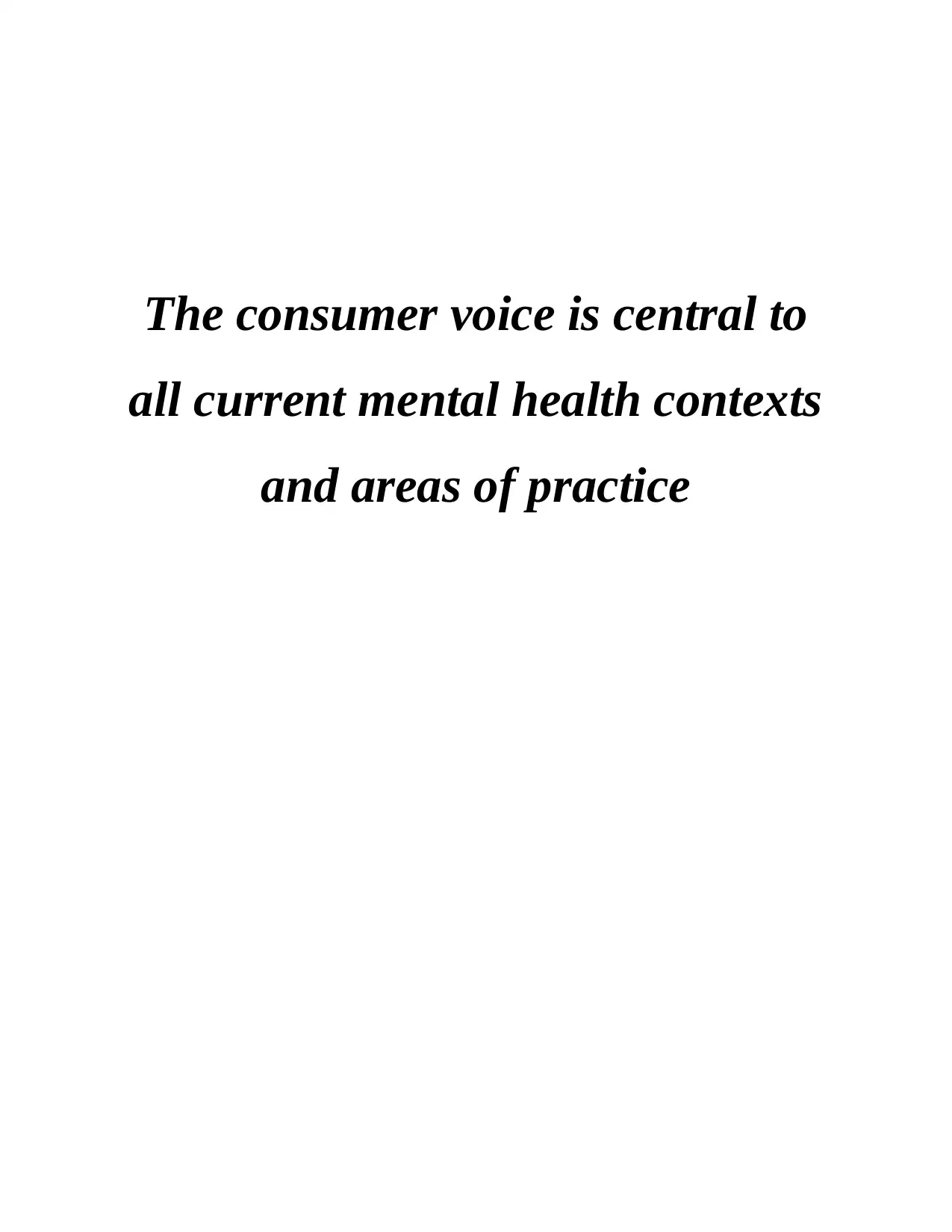
The consumer voice is central to
all current mental health contexts
and areas of practice
all current mental health contexts
and areas of practice
Secure Best Marks with AI Grader
Need help grading? Try our AI Grader for instant feedback on your assignments.

TABLE OF CONTENTS
INTRODUCTION...........................................................................................................................1
MAIN BODY...................................................................................................................................1
CONCLUSION................................................................................................................................3
REFERENCES................................................................................................................................4
INTRODUCTION...........................................................................................................................1
MAIN BODY...................................................................................................................................1
CONCLUSION................................................................................................................................3
REFERENCES................................................................................................................................4
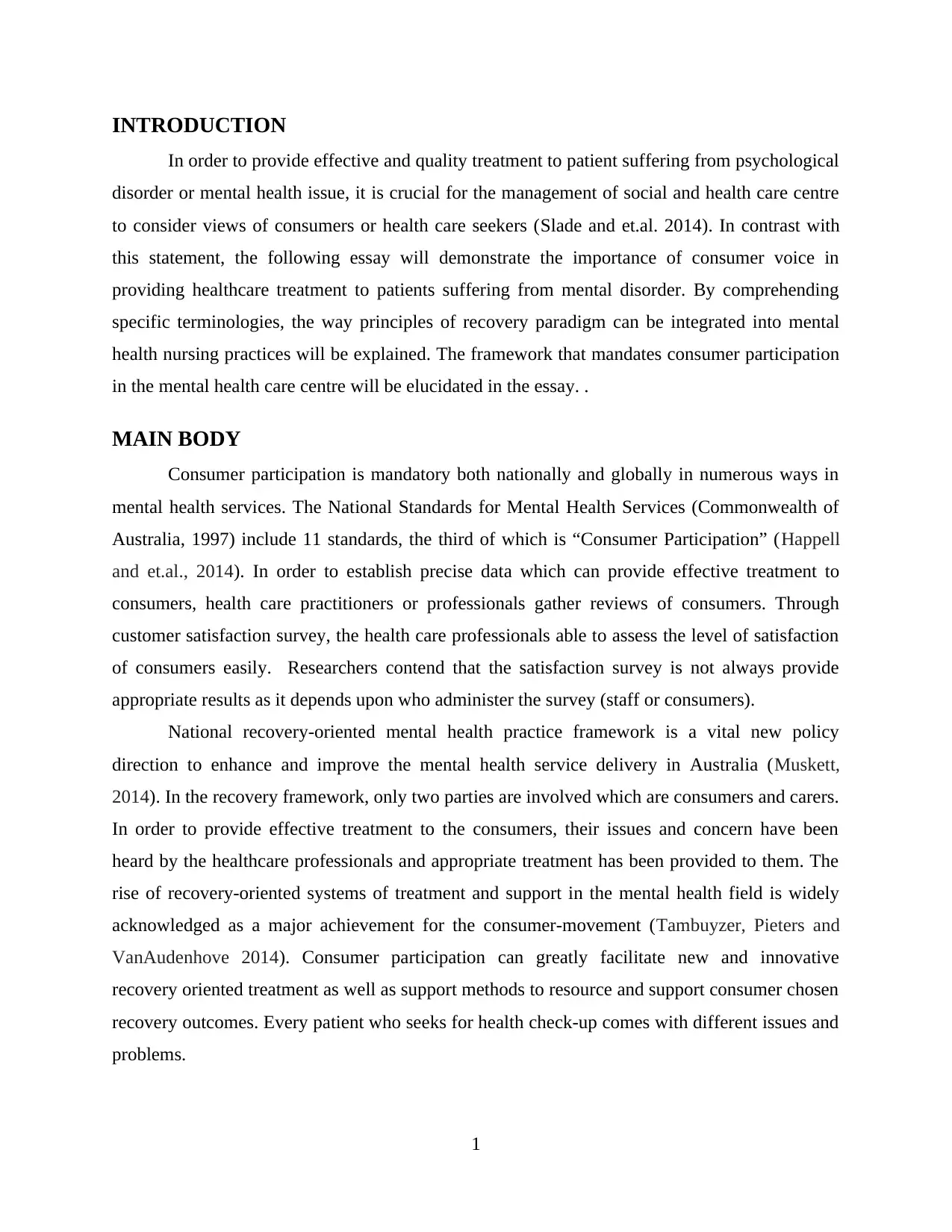
INTRODUCTION
In order to provide effective and quality treatment to patient suffering from psychological
disorder or mental health issue, it is crucial for the management of social and health care centre
to consider views of consumers or health care seekers (Slade and et.al. 2014). In contrast with
this statement, the following essay will demonstrate the importance of consumer voice in
providing healthcare treatment to patients suffering from mental disorder. By comprehending
specific terminologies, the way principles of recovery paradigm can be integrated into mental
health nursing practices will be explained. The framework that mandates consumer participation
in the mental health care centre will be elucidated in the essay. .
MAIN BODY
Consumer participation is mandatory both nationally and globally in numerous ways in
mental health services. The National Standards for Mental Health Services (Commonwealth of
Australia, 1997) include 11 standards, the third of which is “Consumer Participation” (Happell
and et.al., 2014). In order to establish precise data which can provide effective treatment to
consumers, health care practitioners or professionals gather reviews of consumers. Through
customer satisfaction survey, the health care professionals able to assess the level of satisfaction
of consumers easily. Researchers contend that the satisfaction survey is not always provide
appropriate results as it depends upon who administer the survey (staff or consumers).
National recovery-oriented mental health practice framework is a vital new policy
direction to enhance and improve the mental health service delivery in Australia (Muskett,
2014). In the recovery framework, only two parties are involved which are consumers and carers.
In order to provide effective treatment to the consumers, their issues and concern have been
heard by the healthcare professionals and appropriate treatment has been provided to them. The
rise of recovery-oriented systems of treatment and support in the mental health field is widely
acknowledged as a major achievement for the consumer-movement (Tambuyzer, Pieters and
VanAudenhove 2014). Consumer participation can greatly facilitate new and innovative
recovery oriented treatment as well as support methods to resource and support consumer chosen
recovery outcomes. Every patient who seeks for health check-up comes with different issues and
problems.
1
In order to provide effective and quality treatment to patient suffering from psychological
disorder or mental health issue, it is crucial for the management of social and health care centre
to consider views of consumers or health care seekers (Slade and et.al. 2014). In contrast with
this statement, the following essay will demonstrate the importance of consumer voice in
providing healthcare treatment to patients suffering from mental disorder. By comprehending
specific terminologies, the way principles of recovery paradigm can be integrated into mental
health nursing practices will be explained. The framework that mandates consumer participation
in the mental health care centre will be elucidated in the essay. .
MAIN BODY
Consumer participation is mandatory both nationally and globally in numerous ways in
mental health services. The National Standards for Mental Health Services (Commonwealth of
Australia, 1997) include 11 standards, the third of which is “Consumer Participation” (Happell
and et.al., 2014). In order to establish precise data which can provide effective treatment to
consumers, health care practitioners or professionals gather reviews of consumers. Through
customer satisfaction survey, the health care professionals able to assess the level of satisfaction
of consumers easily. Researchers contend that the satisfaction survey is not always provide
appropriate results as it depends upon who administer the survey (staff or consumers).
National recovery-oriented mental health practice framework is a vital new policy
direction to enhance and improve the mental health service delivery in Australia (Muskett,
2014). In the recovery framework, only two parties are involved which are consumers and carers.
In order to provide effective treatment to the consumers, their issues and concern have been
heard by the healthcare professionals and appropriate treatment has been provided to them. The
rise of recovery-oriented systems of treatment and support in the mental health field is widely
acknowledged as a major achievement for the consumer-movement (Tambuyzer, Pieters and
VanAudenhove 2014). Consumer participation can greatly facilitate new and innovative
recovery oriented treatment as well as support methods to resource and support consumer chosen
recovery outcomes. Every patient who seeks for health check-up comes with different issues and
problems.
1
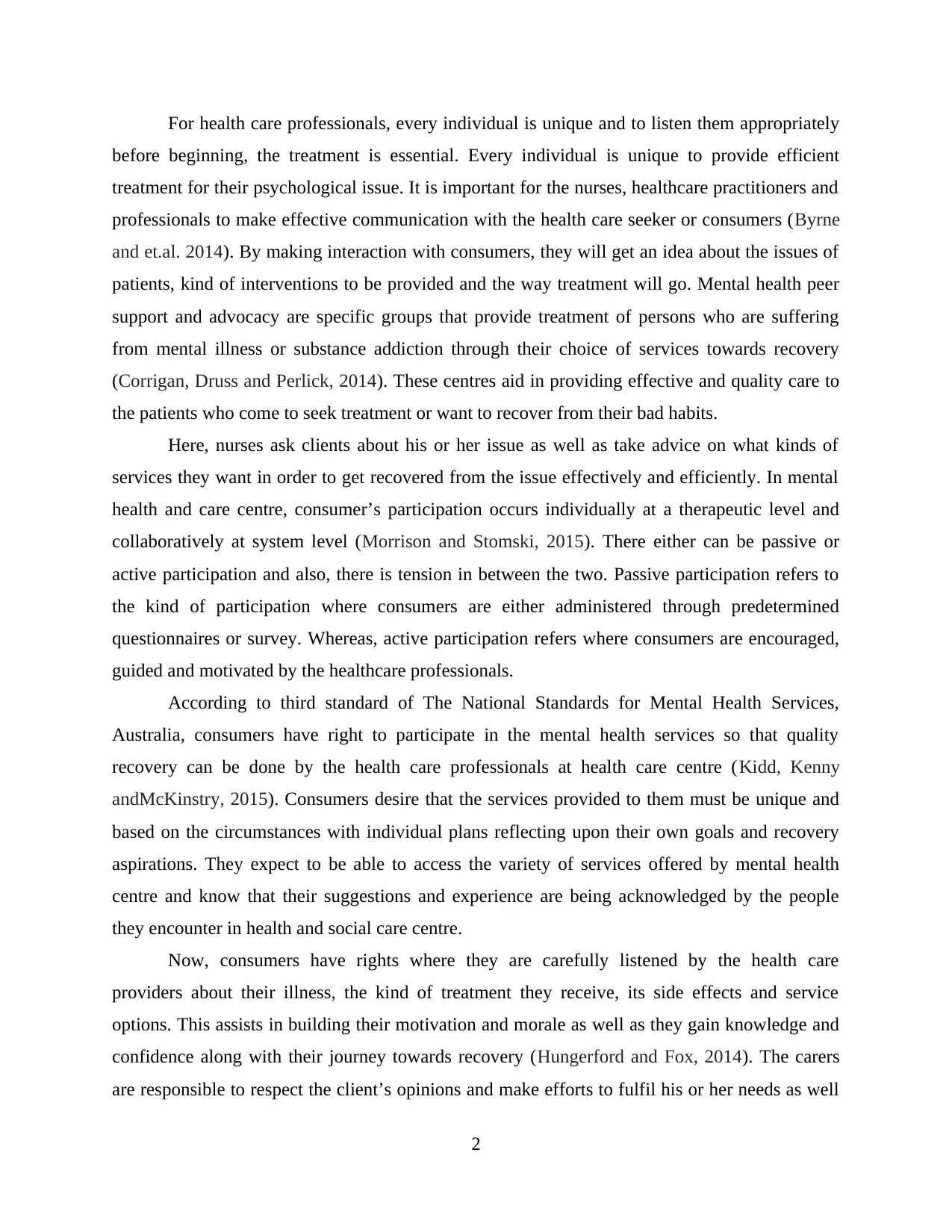
For health care professionals, every individual is unique and to listen them appropriately
before beginning, the treatment is essential. Every individual is unique to provide efficient
treatment for their psychological issue. It is important for the nurses, healthcare practitioners and
professionals to make effective communication with the health care seeker or consumers (Byrne
and et.al. 2014). By making interaction with consumers, they will get an idea about the issues of
patients, kind of interventions to be provided and the way treatment will go. Mental health peer
support and advocacy are specific groups that provide treatment of persons who are suffering
from mental illness or substance addiction through their choice of services towards recovery
(Corrigan, Druss and Perlick, 2014). These centres aid in providing effective and quality care to
the patients who come to seek treatment or want to recover from their bad habits.
Here, nurses ask clients about his or her issue as well as take advice on what kinds of
services they want in order to get recovered from the issue effectively and efficiently. In mental
health and care centre, consumer’s participation occurs individually at a therapeutic level and
collaboratively at system level (Morrison and Stomski, 2015). There either can be passive or
active participation and also, there is tension in between the two. Passive participation refers to
the kind of participation where consumers are either administered through predetermined
questionnaires or survey. Whereas, active participation refers where consumers are encouraged,
guided and motivated by the healthcare professionals.
According to third standard of The National Standards for Mental Health Services,
Australia, consumers have right to participate in the mental health services so that quality
recovery can be done by the health care professionals at health care centre (Kidd, Kenny
andMcKinstry, 2015). Consumers desire that the services provided to them must be unique and
based on the circumstances with individual plans reflecting upon their own goals and recovery
aspirations. They expect to be able to access the variety of services offered by mental health
centre and know that their suggestions and experience are being acknowledged by the people
they encounter in health and social care centre.
Now, consumers have rights where they are carefully listened by the health care
providers about their illness, the kind of treatment they receive, its side effects and service
options. This assists in building their motivation and morale as well as they gain knowledge and
confidence along with their journey towards recovery (Hungerford and Fox, 2014). The carers
are responsible to respect the client’s opinions and make efforts to fulfil his or her needs as well
2
before beginning, the treatment is essential. Every individual is unique to provide efficient
treatment for their psychological issue. It is important for the nurses, healthcare practitioners and
professionals to make effective communication with the health care seeker or consumers (Byrne
and et.al. 2014). By making interaction with consumers, they will get an idea about the issues of
patients, kind of interventions to be provided and the way treatment will go. Mental health peer
support and advocacy are specific groups that provide treatment of persons who are suffering
from mental illness or substance addiction through their choice of services towards recovery
(Corrigan, Druss and Perlick, 2014). These centres aid in providing effective and quality care to
the patients who come to seek treatment or want to recover from their bad habits.
Here, nurses ask clients about his or her issue as well as take advice on what kinds of
services they want in order to get recovered from the issue effectively and efficiently. In mental
health and care centre, consumer’s participation occurs individually at a therapeutic level and
collaboratively at system level (Morrison and Stomski, 2015). There either can be passive or
active participation and also, there is tension in between the two. Passive participation refers to
the kind of participation where consumers are either administered through predetermined
questionnaires or survey. Whereas, active participation refers where consumers are encouraged,
guided and motivated by the healthcare professionals.
According to third standard of The National Standards for Mental Health Services,
Australia, consumers have right to participate in the mental health services so that quality
recovery can be done by the health care professionals at health care centre (Kidd, Kenny
andMcKinstry, 2015). Consumers desire that the services provided to them must be unique and
based on the circumstances with individual plans reflecting upon their own goals and recovery
aspirations. They expect to be able to access the variety of services offered by mental health
centre and know that their suggestions and experience are being acknowledged by the people
they encounter in health and social care centre.
Now, consumers have rights where they are carefully listened by the health care
providers about their illness, the kind of treatment they receive, its side effects and service
options. This assists in building their motivation and morale as well as they gain knowledge and
confidence along with their journey towards recovery (Hungerford and Fox, 2014). The carers
are responsible to respect the client’s opinions and make efforts to fulfil his or her needs as well
2
Secure Best Marks with AI Grader
Need help grading? Try our AI Grader for instant feedback on your assignments.
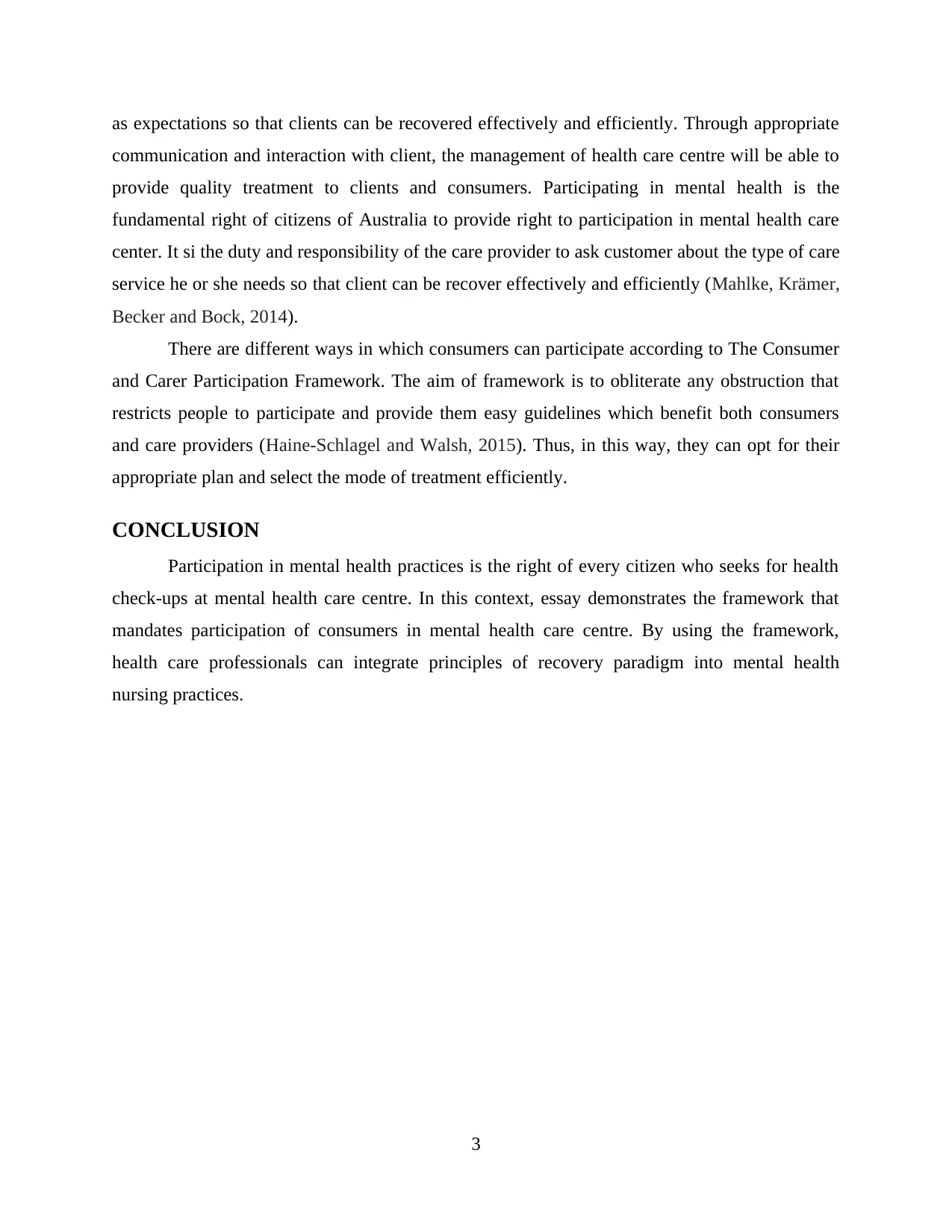
as expectations so that clients can be recovered effectively and efficiently. Through appropriate
communication and interaction with client, the management of health care centre will be able to
provide quality treatment to clients and consumers. Participating in mental health is the
fundamental right of citizens of Australia to provide right to participation in mental health care
center. It si the duty and responsibility of the care provider to ask customer about the type of care
service he or she needs so that client can be recover effectively and efficiently (Mahlke, Krämer,
Becker and Bock, 2014).
There are different ways in which consumers can participate according to The Consumer
and Carer Participation Framework. The aim of framework is to obliterate any obstruction that
restricts people to participate and provide them easy guidelines which benefit both consumers
and care providers (Haine-Schlagel and Walsh, 2015). Thus, in this way, they can opt for their
appropriate plan and select the mode of treatment efficiently.
CONCLUSION
Participation in mental health practices is the right of every citizen who seeks for health
check-ups at mental health care centre. In this context, essay demonstrates the framework that
mandates participation of consumers in mental health care centre. By using the framework,
health care professionals can integrate principles of recovery paradigm into mental health
nursing practices.
3
communication and interaction with client, the management of health care centre will be able to
provide quality treatment to clients and consumers. Participating in mental health is the
fundamental right of citizens of Australia to provide right to participation in mental health care
center. It si the duty and responsibility of the care provider to ask customer about the type of care
service he or she needs so that client can be recover effectively and efficiently (Mahlke, Krämer,
Becker and Bock, 2014).
There are different ways in which consumers can participate according to The Consumer
and Carer Participation Framework. The aim of framework is to obliterate any obstruction that
restricts people to participate and provide them easy guidelines which benefit both consumers
and care providers (Haine-Schlagel and Walsh, 2015). Thus, in this way, they can opt for their
appropriate plan and select the mode of treatment efficiently.
CONCLUSION
Participation in mental health practices is the right of every citizen who seeks for health
check-ups at mental health care centre. In this context, essay demonstrates the framework that
mandates participation of consumers in mental health care centre. By using the framework,
health care professionals can integrate principles of recovery paradigm into mental health
nursing practices.
3
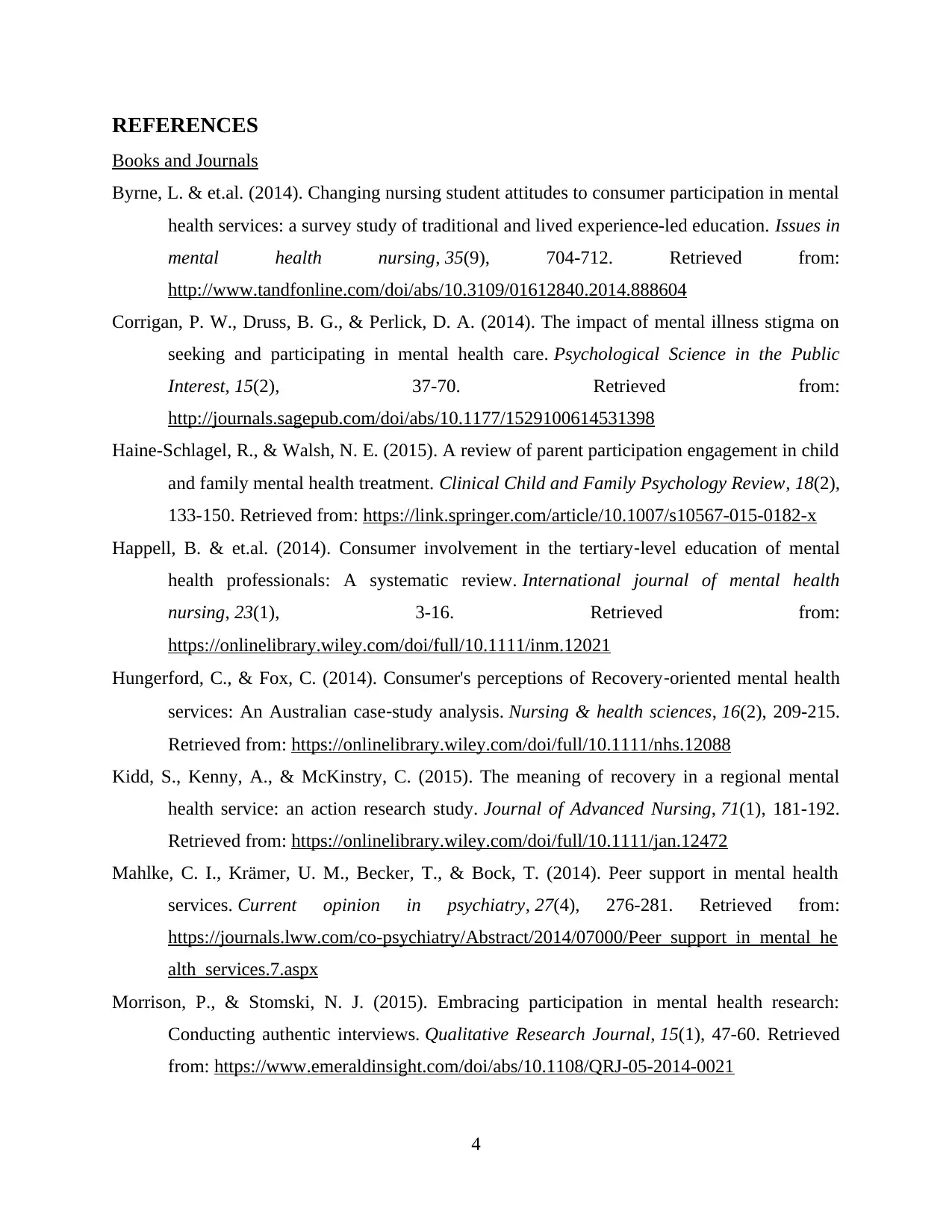
REFERENCES
Books and Journals
Byrne, L. & et.al. (2014). Changing nursing student attitudes to consumer participation in mental
health services: a survey study of traditional and lived experience-led education. Issues in
mental health nursing, 35(9), 704-712. Retrieved from:
http://www.tandfonline.com/doi/abs/10.3109/01612840.2014.888604
Corrigan, P. W., Druss, B. G., & Perlick, D. A. (2014). The impact of mental illness stigma on
seeking and participating in mental health care. Psychological Science in the Public
Interest, 15(2), 37-70. Retrieved from:
http://journals.sagepub.com/doi/abs/10.1177/1529100614531398
Haine-Schlagel, R., & Walsh, N. E. (2015). A review of parent participation engagement in child
and family mental health treatment. Clinical Child and Family Psychology Review, 18(2),
133-150. Retrieved from: https://link.springer.com/article/10.1007/s10567-015-0182-x
Happell, B. & et.al. (2014). Consumer involvement in the tertiary‐level education of mental
health professionals: A systematic review. International journal of mental health
nursing, 23(1), 3-16. Retrieved from:
https://onlinelibrary.wiley.com/doi/full/10.1111/inm.12021
Hungerford, C., & Fox, C. (2014). Consumer's perceptions of Recovery‐oriented mental health
services: An Australian case‐study analysis. Nursing & health sciences, 16(2), 209-215.
Retrieved from: https://onlinelibrary.wiley.com/doi/full/10.1111/nhs.12088
Kidd, S., Kenny, A., & McKinstry, C. (2015). The meaning of recovery in a regional mental
health service: an action research study. Journal of Advanced Nursing, 71(1), 181-192.
Retrieved from: https://onlinelibrary.wiley.com/doi/full/10.1111/jan.12472
Mahlke, C. I., Krämer, U. M., Becker, T., & Bock, T. (2014). Peer support in mental health
services. Current opinion in psychiatry, 27(4), 276-281. Retrieved from:
https://journals.lww.com/co-psychiatry/Abstract/2014/07000/Peer_support_in_mental_he
alth_services.7.aspx
Morrison, P., & Stomski, N. J. (2015). Embracing participation in mental health research:
Conducting authentic interviews. Qualitative Research Journal, 15(1), 47-60. Retrieved
from: https://www.emeraldinsight.com/doi/abs/10.1108/QRJ-05-2014-0021
4
Books and Journals
Byrne, L. & et.al. (2014). Changing nursing student attitudes to consumer participation in mental
health services: a survey study of traditional and lived experience-led education. Issues in
mental health nursing, 35(9), 704-712. Retrieved from:
http://www.tandfonline.com/doi/abs/10.3109/01612840.2014.888604
Corrigan, P. W., Druss, B. G., & Perlick, D. A. (2014). The impact of mental illness stigma on
seeking and participating in mental health care. Psychological Science in the Public
Interest, 15(2), 37-70. Retrieved from:
http://journals.sagepub.com/doi/abs/10.1177/1529100614531398
Haine-Schlagel, R., & Walsh, N. E. (2015). A review of parent participation engagement in child
and family mental health treatment. Clinical Child and Family Psychology Review, 18(2),
133-150. Retrieved from: https://link.springer.com/article/10.1007/s10567-015-0182-x
Happell, B. & et.al. (2014). Consumer involvement in the tertiary‐level education of mental
health professionals: A systematic review. International journal of mental health
nursing, 23(1), 3-16. Retrieved from:
https://onlinelibrary.wiley.com/doi/full/10.1111/inm.12021
Hungerford, C., & Fox, C. (2014). Consumer's perceptions of Recovery‐oriented mental health
services: An Australian case‐study analysis. Nursing & health sciences, 16(2), 209-215.
Retrieved from: https://onlinelibrary.wiley.com/doi/full/10.1111/nhs.12088
Kidd, S., Kenny, A., & McKinstry, C. (2015). The meaning of recovery in a regional mental
health service: an action research study. Journal of Advanced Nursing, 71(1), 181-192.
Retrieved from: https://onlinelibrary.wiley.com/doi/full/10.1111/jan.12472
Mahlke, C. I., Krämer, U. M., Becker, T., & Bock, T. (2014). Peer support in mental health
services. Current opinion in psychiatry, 27(4), 276-281. Retrieved from:
https://journals.lww.com/co-psychiatry/Abstract/2014/07000/Peer_support_in_mental_he
alth_services.7.aspx
Morrison, P., & Stomski, N. J. (2015). Embracing participation in mental health research:
Conducting authentic interviews. Qualitative Research Journal, 15(1), 47-60. Retrieved
from: https://www.emeraldinsight.com/doi/abs/10.1108/QRJ-05-2014-0021
4
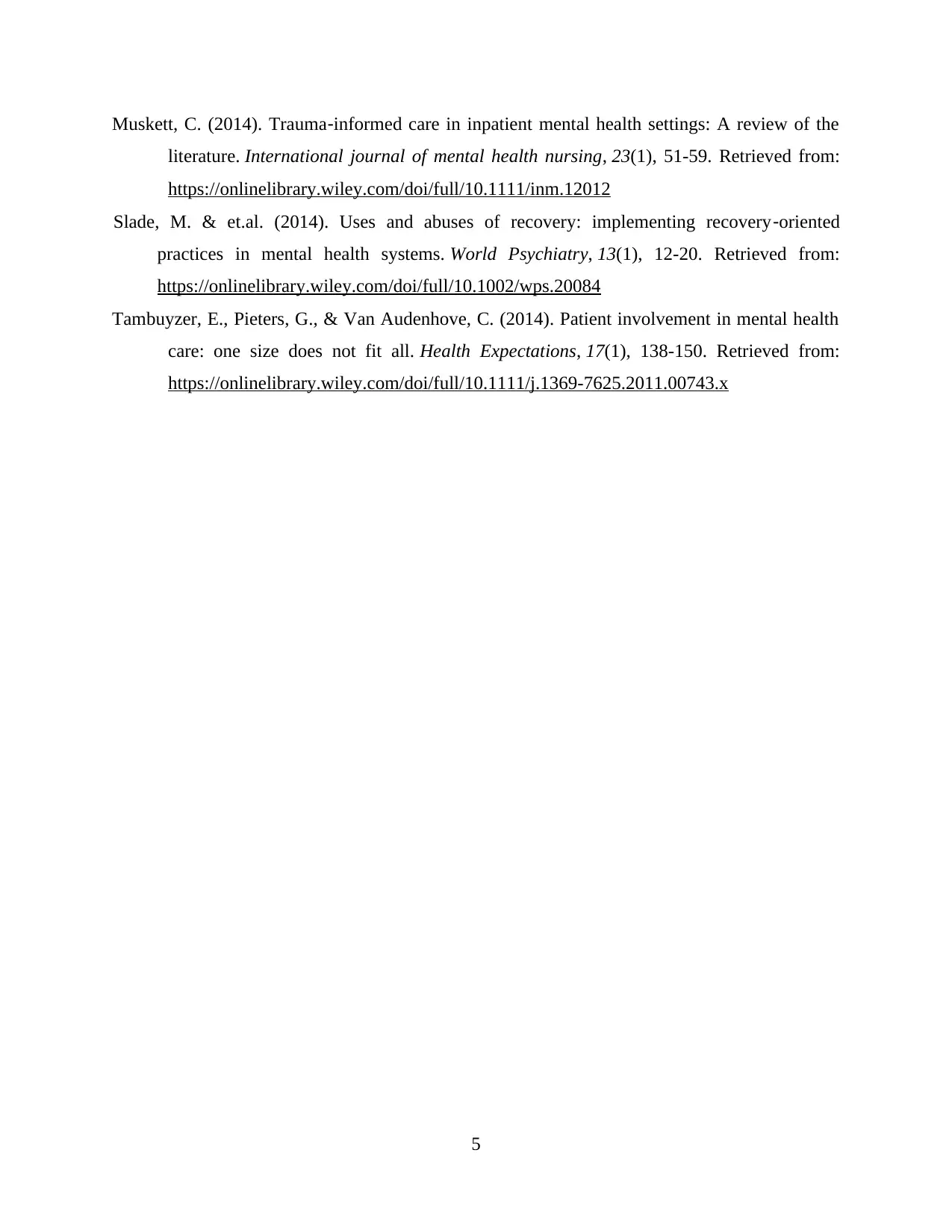
Muskett, C. (2014). Trauma‐informed care in inpatient mental health settings: A review of the
literature. International journal of mental health nursing, 23(1), 51-59. Retrieved from:
https://onlinelibrary.wiley.com/doi/full/10.1111/inm.12012
Slade, M. & et.al. (2014). Uses and abuses of recovery: implementing recovery‐oriented
practices in mental health systems. World Psychiatry, 13(1), 12-20. Retrieved from:
https://onlinelibrary.wiley.com/doi/full/10.1002/wps.20084
Tambuyzer, E., Pieters, G., & Van Audenhove, C. (2014). Patient involvement in mental health
care: one size does not fit all. Health Expectations, 17(1), 138-150. Retrieved from:
https://onlinelibrary.wiley.com/doi/full/10.1111/j.1369-7625.2011.00743.x
5
literature. International journal of mental health nursing, 23(1), 51-59. Retrieved from:
https://onlinelibrary.wiley.com/doi/full/10.1111/inm.12012
Slade, M. & et.al. (2014). Uses and abuses of recovery: implementing recovery‐oriented
practices in mental health systems. World Psychiatry, 13(1), 12-20. Retrieved from:
https://onlinelibrary.wiley.com/doi/full/10.1002/wps.20084
Tambuyzer, E., Pieters, G., & Van Audenhove, C. (2014). Patient involvement in mental health
care: one size does not fit all. Health Expectations, 17(1), 138-150. Retrieved from:
https://onlinelibrary.wiley.com/doi/full/10.1111/j.1369-7625.2011.00743.x
5
1 out of 7
Related Documents
Your All-in-One AI-Powered Toolkit for Academic Success.
+13062052269
info@desklib.com
Available 24*7 on WhatsApp / Email
![[object Object]](/_next/static/media/star-bottom.7253800d.svg)
Unlock your academic potential
© 2024 | Zucol Services PVT LTD | All rights reserved.





